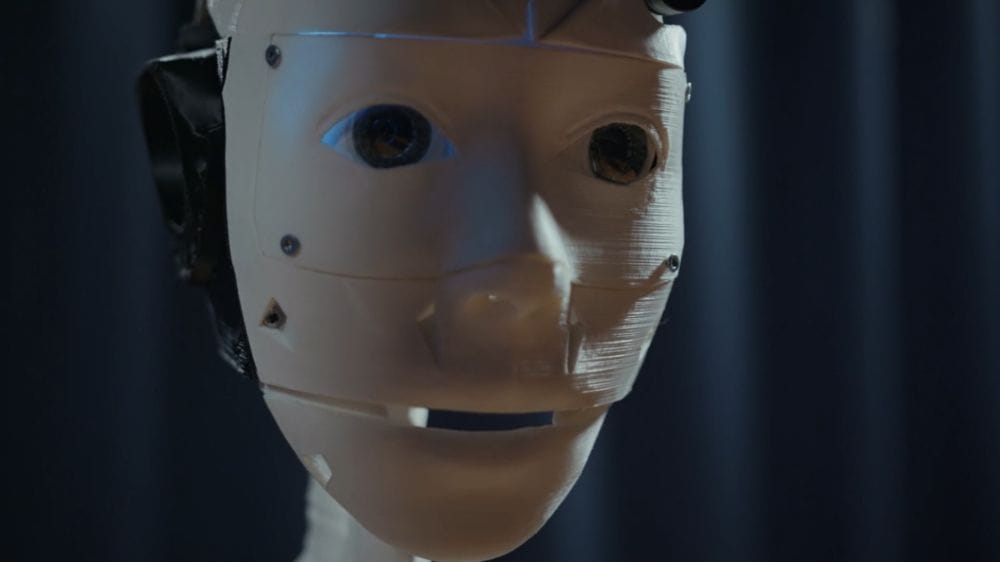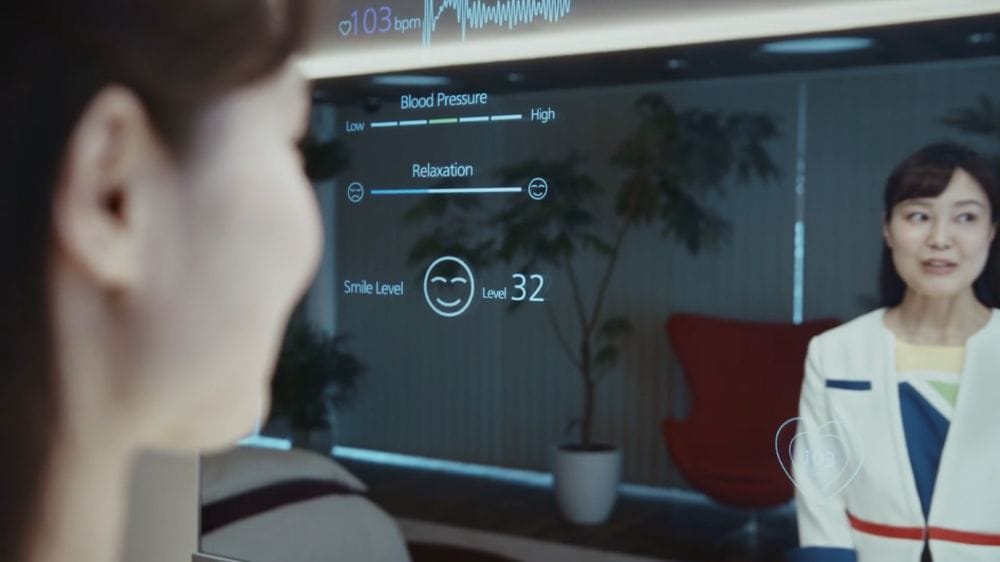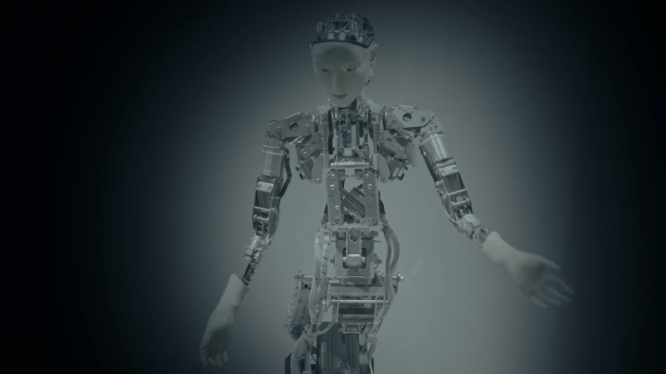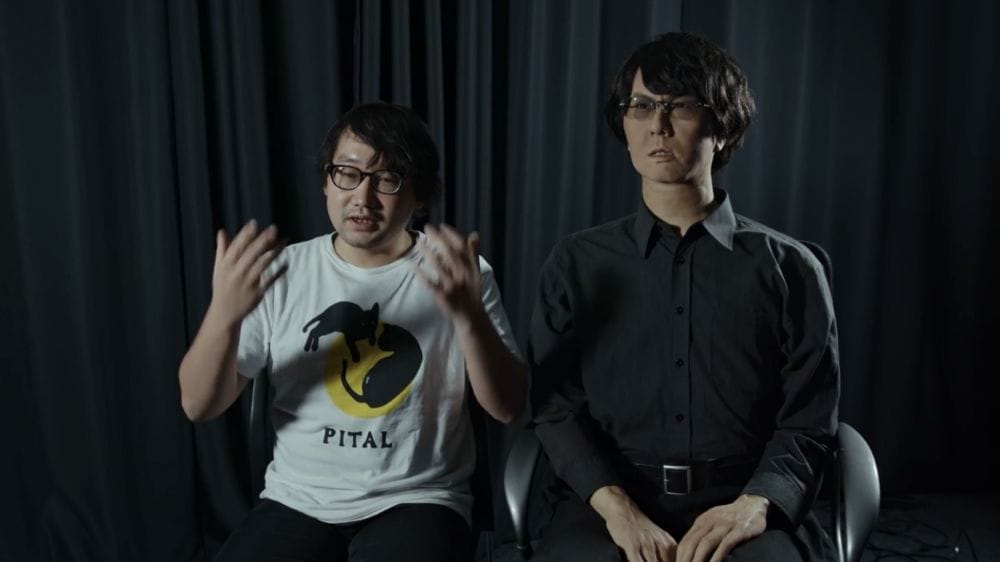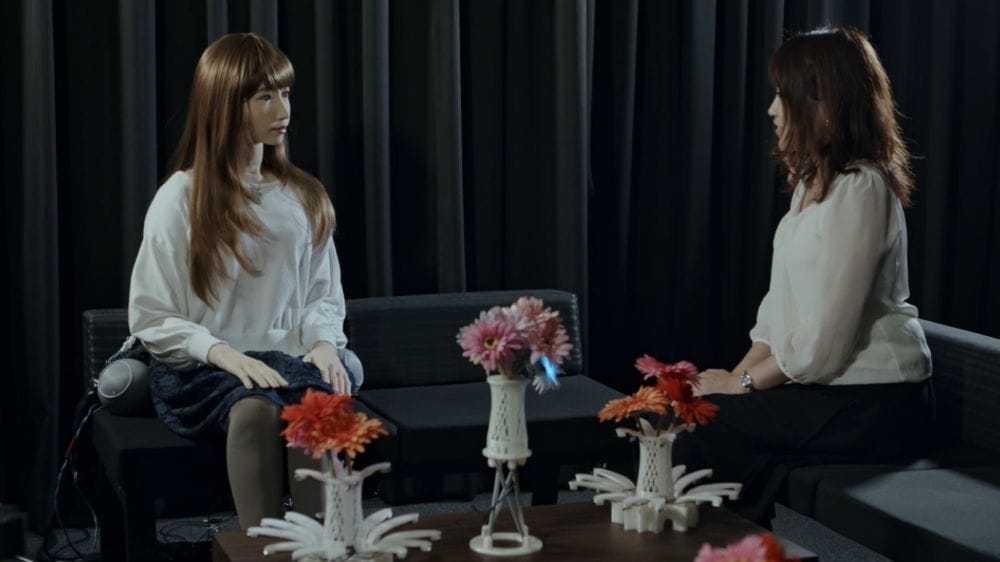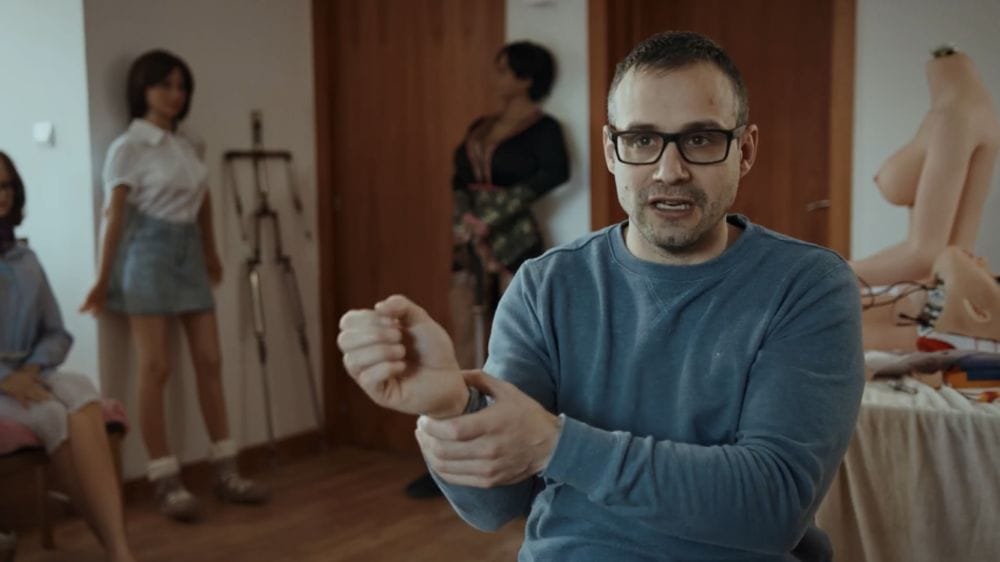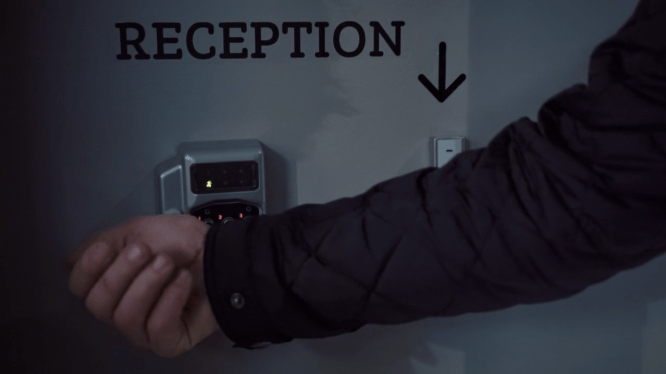Who Made You opens with whirring and beeping machines, as the camera pans up to reveal the porcelain white body of a lone robot. It stares vacantly into something off camera with its eerily large eyes, as a young boy stands right in front of it, tilting his head in curiosity.
“Who Made You?” The young boy asks the titular question, to which the robot promptly responds by describing where its parts were from and where it was assembled. The robot then retorts and asks the boy who made him. The boy is taken aback by the question at first, but responds with “my mom.” The conversation ends with the robot expressing its goals to be integrated with human society.
The overall tone of Who Made You is eerie and ethereal. We not only hear the background sounds of buzzing machinery, but also and choral voices humming in our ears as the camera makes us stare at a robot’s large eyes for an extended period of time.
In another scene, a woman asks an android whether it thinks it has a soul. The android—built and dressed to resemble an Asian woman—takes a few seconds to process that question. It responds in a polite manner, saying that it thinks humanity believes themselves to be special by having souls, something that machines could not have.
“It is very lonely,” laments the android. “I’m supposed to be a social robot … I would very much like to be able to move my legs and get out of this room.”
The question becomes, did the android truly express its loneliness, or was it programmed to say that to invoke a sense of empathy? Since androids are designed to look, sound, and feel more like their creators, it’s expected that they cross the threshold of the uncanny valley—they look human but they aren’t, and something about that is unsettling.
OVID.tv explores the future of humanity and artificial intelligence
Who Made You takes a dip into the developing world of what was once restricted in the genre of science fiction—cyborgs with antennas and microchips implanted into their bodies; robots made for human pleasure; and fully functioning androids. By looking at the advancement of technology on a global scale, the young Dr. Micheal Laakasuo speaks with the greatest minds in the field from Greece to Spain, from Finland to Japan, and beyond.
In between interviews with the long-haired Dr. Laakasuo and another expert, there are segments where the same porcelain white robot speaks with several children. Those young children all have the same inquisitive yet cautious attitude, as they stand a couple of feet from the robot, heads tilted in awe mixed with a dash of anxiety. A young boy asks the robot to give him a high five. The robot attempts to oblige by awkwardly raising its straight arm for the boy to reach. Another child asks if the robot can draw, to which the robot responds that it cannot, but wishes to learn. In another conversation, a young girl sheepishly looks off camera while the robot asks if she thinks robots and humans are similar. While these interactions may seem awkward, the film prompts us to consider that someday in the future these children will interact with more robots.
Revisiting the conversation between the android and the woman, the android once said that robots, like their creators, have a lot of potential for good and evil. Can machines bring about peace in the world, or would the future of a Skynet-dominated world be an inevitability? What is the most likely and realistic application of complex technology like AIs? These are the discussion points touched on by experts like Timo Honkela and Jyrki Kasvi, who like many others are optimistic yet wary about the future applications of such technology.
And how will technology help or enhance humans? Who Made You also takes a look at cyborgs—people who have integrated technology into their bodies by implanting a microchip into their hands as a multipurpose access card. As well, we meet people like Neil Harbisson, who identifies as a cyborg and uses an antenna as an extension of himself to see color. While one would expect cyborgs to be outfitted with fully functioning robotic limbs or exoskeletons, people like Harbisson —who have implants that enhance their everyday lives—consider themselves cyborgs, no less than how a person with a pacemaker could be considered one as well.
Throughout the film the ethical implications loom over every engineer who hopes to create a technological innovation. Like any piece of technology, Dr. Laakasuo says that AI will have to be regulated, and the ethics of computer science must be studied even more. Humanity is on a cusp of technological transition, an era where the line between humanity and artificial intelligence blend together.
The topic of sex dolls is briefly touched on, as Spanish inventor Sergi Santos—accompanied by his wife— talks about the technicalities of building and programming sex dolls for adults. He demonstrates their utilities by pressing onto certain parts of the doll’s plastic and metal body. The film even shows a young man beginning to engage in a sexual encounter with a doll, as the doll responds with pre-recorded sounds. Some viewers may find this scene or the idea of sex dolls offensive, and likely would be better off, in this writer’s opinion, skipping that section entirely.
OVID.tv’s Who Made You explores what artificial intelligence means for mankind, and the ethical implications behind it. Those who love to learn about computer science would enjoy this film, and it can also stand as a starting point for learning about AI.
RECOMMENDED
Nominate this for The Picture This Post BEST OF 2021???
Click Readers' Choice
Want to see who won the Picture This Post READERS’ CHOICE competition last year?
WATCH THIS SHORT VIDEO—
Cast/Featured Experts:
Michael Laakasuo - Adj. Prof. of Cognitive Science
Taneli Tikka - Innovation Leader
Joanna Bryson - Assoc. Prof. of Computer Sciences
Kaj Sotala - Researcher
Sergi Santos - PhD in Nanotechnology
Timo Honkela - Prof. Computer Scientist
Jyrki Kasvi - Member of Finnish Parliament
Yukiyasu Kamitani - Prof. Neuroscientist
Jowan Osterlund - CEO Biohax International
Neil Harbisson - Cyborg
Kohei Ogawa - Assoc. Prof. of Robot Technology
Hiroshi Ishiguro - Professor
Creative Team:
Directed by: Iiris Härmä
Cinematography: Visa Koiso-Kanttila
Film Editing: Timo Peltola
Sound Design: Janne Laine
Music: Per Störby Jutbring
For more information and to watch the film, visit the OVID.tv page for Who Made You
Images courtesy of OVID.tv

About the Author: Jay Ku
When not homesick for Hong Kong's sizzling street food and bustling nightlife, Jay is a freelance writer with a deep fascination with the fantasy sci fi genre. His idols are Rick Riordan, Andrej Sapkowski, and Brandon Sanderson. When he is not writing articles or working on his creative writing project, Jay is playing video games (his all time fave is Witcher 3), watching anime, reading, playing the bass guitar, and doing digital art. Follow Jay @jac0kieran.

